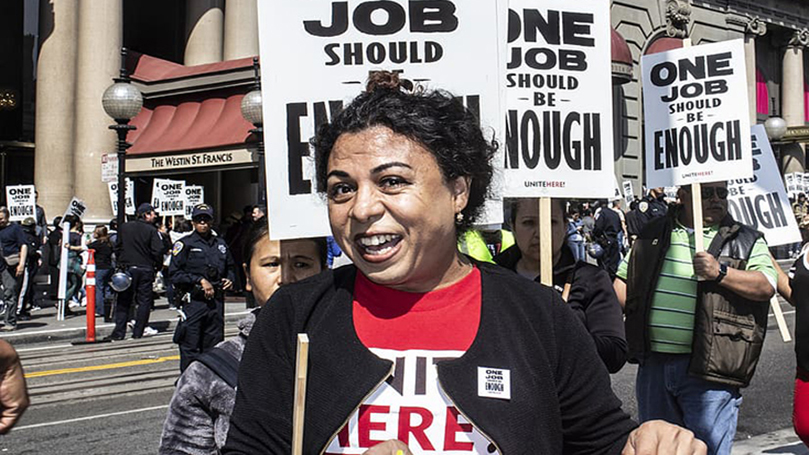
With Trump’s defeat, the country stands on the threshold of a new political period. One phase of the anti-right struggle, the battle for the presidency and Congress, is almost complete. Another phase, the struggle for the soul of the nation, is now taking shape.
Things are shifting, albeit slowly, even dangerously, but overall in a better direction. The Supreme Court’s apparently unanimous one-sentence refusal to hear the GOP’s challenge to the Pennsylvania vote was an important nudge forward.
Trump and company are now on the defensive and attempting to regroup by challenging the very legitimacy of the election. Some 80% of Republicans have taken the bait. With an eye toward the GOP base and fearing Trump’s wrath, only 28 Republican members of Congress so far have acknowledged that there’s a president-elect, a pressure sure to impact current negotiations for a stimulus to say nothing of their attitude toward the new administration.
The need for a popular front is not over — far from it — but its forms are changing. New coalitions and alliances are emerging during the transition. This should surprise no one. Coalitions come together and fall apart, rise and fall, around specific issues and objectives. Usually once these objectives are achieved, the coalitions subside and no amount of wishful thinking can change that — unless, of course, new circumstances arise. This includes the all-people’s front. In fact the broader the front, the wider and more fragile the basis of unity, the more likely are sections to fall away once principal goals are won.
Some politicians who joined forces to defeat Trump, for example, have already staked out differing positions on various issues while remaining united on others. The debate around Senator Joe Manchin’s compromise on the pandemic relief bill is a case in point, with Bernie Sanders taking a firm stance against it, and rightly so.
But that’s to be expected — the people’s front is not static; different class forces have differing objectives and needs. Even within the working class there are various demands and interests. Shifts, vacillations, and even sell-outs can occur, depending on the pressure of the moment. It’s critical therefore to keep our eyes on the prize — such as the outcome in Georgia on January 5th.
A battle for position is bound to occur both between reaction and democracy and among their respective camps. The class struggle continues, as does the battle for democracy.
Needless to say, keeping the anti-Trump movement as united as possible will be vital. Here it will be important to distinguish between principled issues — where compromise is unthinkable — and secondary ones open to negotiation.
Everything rests on the balance of forces and the willingness of those forces to fight.
One such debate will be on the new administration’s mandate. Can compromise be contemplated, or would everything be placed in jeopardy? Clearly, in this instance, given the fascist danger, challenges to the Democratic victory and right to govern should be rejected out of hand.
A related battle will be on platform and predictable efforts to scale back proposals to appease GOP intransigence. Here the distinction between principles and tactics is more complicated. Recall, for example, Obama’s ill-conceived attempt at a Grand Compromise or the evolution of the Affordable Care Act. Everything here rests on the relative balance of forces and the willingness of those forces to fight.
Obama, for example, during his first two years in office, had Democratic majorities in the House and Senate. However, part of those majorities were Blue Dogs, that is, moderates, in swing districts. Many, on key issues, aligned themselves with the GOP. This pattern will likely repeat itself in the next Congress. All-or-nothing propositions in these circumstances are obstacles to unity needed between left and center with respect to larger issues of isolating and defeating the right. On the other hand, we are not obliged to support any measure put forward by the ruling party. Everything must weighed on the basis of whether or not it advances working-class interests.
This is why Communists support Constitutional reforms. The endless struggles between progress and compromise, over which party will have control of the Senate, etc., are natural foes of democracy, or rule of the majority of the working class.
That said, there should be no illusions regarding current negotiations with Trump still in power or even after he leaves office.
The platform that folks voted for on November 3 should be fought for tooth-and-nail.
The Republican Party is sure to wage a no-holds-barred effort to block each and every initiative of the new administration. They will attempt to do to Biden what they did to Obama and with relish — all with an eye not only to the midterms but also to a possible reprise of a Harris bid for the presidency. Here, struggle is the better part of valor. The platform that folks voted for on November 3 should be fought for tooth-and-nail.
Remember, GOP appeasement is likened unto death. Republicans are sure to beat compromised Democratic corpses over the heads with such efforts, hoping to split their coalition, dispirit the ranks, and rob it of its best fighters.
This raises the sticky issue of unity and how to lead going forward. In this regard, there are no ready-made formulas. Considerations will have to be made on an issue-by-issue basis as organizations and movements coalesce and dissolve depending on the topic.
It is important to realize that the new administration’s main task, precisely because it is a new administration, will be to govern with all that this entails: addressing the multiple health, economic, environmental, social, and political crises the country faces.
This means, in the first place, putting together a cabinet. Who is nominated is not nearly as important as continuing to build independent working-class movements on the ground around key issues. It’s not a given, for example, that having the left in the cabinet is a positive. Why? Because the individuals involved and the forces they represent get blamed for the failures of the administration. The Communist Party of France paid dearly for their presence in the austerity-driven Mitterrand government during the 1980s. More recently, the Communist Party of Brazil drew similar conclusions from their participation in the Worker’s Party–led government. The Portugese CP, while giving parliamentary support to a new administration, chose not to seat ministers.
Once inaugurated, the new president will face a chief task: countering Trump’s neo-Confederate, fascist-tinged revolt. Hopefully it’s not lost on the Democrats that Trump and his rogue GOP will not become a loyal opposition. Hopefully, but let’s not count on it.
The GOP is a runaway mass movement drifting toward extreme-right policies, even fascism.
Noam Chomsky once described the GOP as the most dangerous political party in history, and he’s right. And this was far earlier than during Trump’s current coup efforts.
The GOP and their Wall Street backers have taken up white supremacy, homophobia, sexism, and crude “America First” national chauvinism and set this toxic brew on fire. As Joel Wendland has pointed out, the GOP is not an ordinary political party, but a runaway mass movement drifting toward extreme-right policies, even fascism.
In this regard, leadership in the fight against the impending crisis cannot be left to the new administration.
The role of a U.S. president, standing at the head of state (or, as we’ve seen at times, standing a little above it) and ostensibly representing all class interests, almost by definition prevents stewardship of such a process. A U.S. president has to govern, but this means managing class interests. And under capitalism, doing so effectively means maximizing corporate profits while offending the least number of people. Let’s not forget that capital requires stability or as much stability as possible, even if within the framework of the much talked-about new reset.
Some expected, for example, that Barack Obama, riding the wave of an unprecedented mass movement, would lead a transformational moment in American life. And while his historic tenure was certainly a moment, the first Black president’s time in office was hardly transformational. That hope fell flat as the new president came face-to-face with stiff reality, even before the 2010 midterms, but particularly after the Tea Party backlash. Expectations that Obama might, after leaving office, employ his still considerable following to lead the momentous resistance to Trump also failed to materialize, hemmed in as he was by the considerable weight of the rules of conduct governing ex-presidents.
The same can be said for FDR and the New Deal period, when transformational processes were set in motion. Leadership then came from the ground up, from the organizers in steel, auto, electric, from the fighters in the tobacco fields and coal mines, from the heroes of the sharecroppers’ unions battling Jim Crow and racist vigilantes.
The lessons here are that leadership cannot be left to the Democratic Party. As a multi-class party dominated by big business, it is the most organized electoral vehicle for defeating the Trump forces. In its ranks are also the racially oppressed, labor, along with the women, LGBTQ, and youth. Important figures have emerged there in the fightback. But as important are the independent movements that have emerged alongside it. In fact, the November 3 victory would have been impossible without these independent initiatives.
Going forward, the leadership and direction of the front will be contested — that’s only natural. The art of how to do so without falling into right-wing traps will be key.
Yes, the people’s forces must give leadership. Initiative will be in the hands of those who act — and tailing developments should be avoided at all costs. The Communist Party in particular must fight for working-class leadership of this process. That means remaining mobilized to defend the vote, but also to fight for the measures required to address the multiple crises left by the outgoing administration.
Image: PXfuel.


 Join Now
Join Now